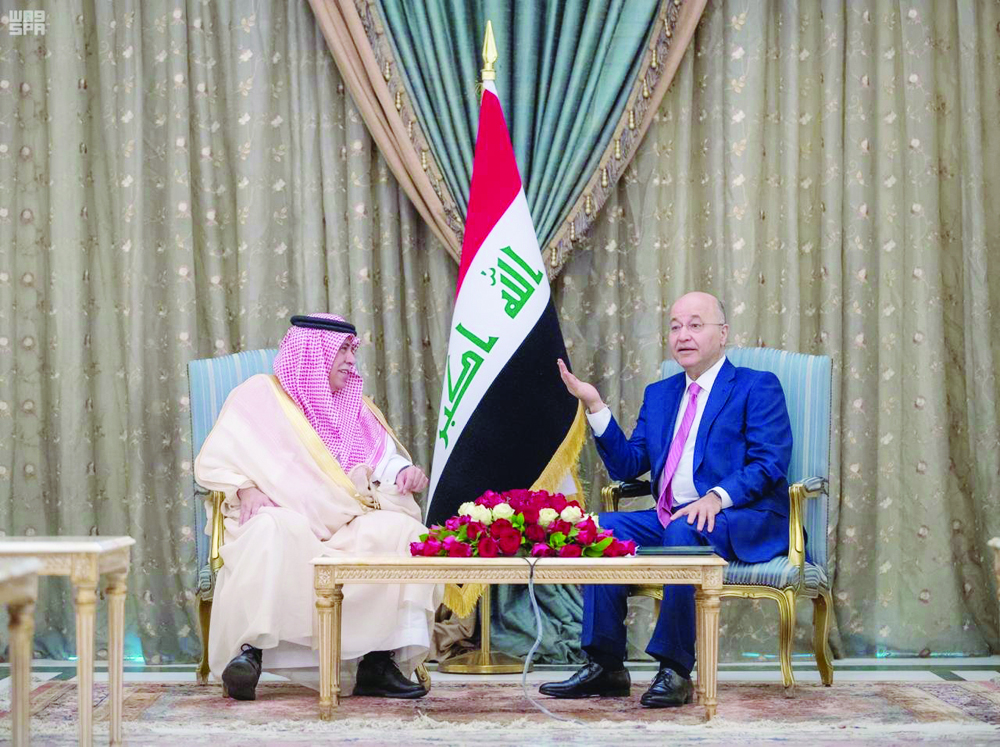‘New phase of relations’ begins between Saudi Arabia and Iraq
BAGHDAD, Iraq: A “new phase of relations” has begun between the Kingdom and Iraq, a Saudi minister said Thursday, following the inauguration of a new consulate in Baghdad and the announcement of a $1 billion development loan, the Saudi Press Agency reported.
“We have seen from the Iraqi side sincere feelings of brotherhood,” said Saudi Minister of Commerce and Investment Majid bin Abdullah Al-Qassabi. Additional diplomatic missions would open in other Iraqi cities soon, he added.
Iraqi President Barham Salih met Al-Qassabi and his accompanying delegation on the sidelines of the second meeting of the Saudi-Iraqi Coordination Council, which wrapped up in the capital on Thursday.
Al-Qassabi conveyed a greeting from King Salman and Crown Prince Mohammed bin Salman to the Iraqi president, government and people.
The Saudi delegation also met Iraqi Prime Minister Adil Abdulmahdi. They reviewed ways of enhancing and supporting bilateral relations and discussed issues of mutual interest.
Parliament Speaker Mohamed Al-Halbousi also received the Saudi economic delegation.
Al-Halbousi confirmed Parliament’s desire to provide all the necessary legislation to develop investment and commercial sectors to strengthen the relationship with Saudi Arabia.
Meanwhile, the Iraqi Foreign Ministry said the participation of Iraqi Foreign Minister Mohamed Ali Al-Hakim at the consulate’s opening ceremony was a tangible sign of enhanced communication between the two nations.
The ministry said this participation also reflected the wish of both countries to facilitate consular services for Muslims wanting to visit Saudi Arabia’s holy sites or perform Hajj and Umrah, as well as to facilitate labor movement procedures and trade exchange.
The opening of the new consulate came as senior ministers from the Kingdom visited Baghdad as part of a meeting of the Saudi-Iraqi Coordination Council. The meeting discussed ways to improve cooperation and bilateral relations, and to coordinate efforts to develop a strategic partnership and foster the exchange of professional and technical experience.
Saudi Arabia will provide Iraq with $1 billion in loans for development projects, Al-Qassabi said, plus $500 million to boost exports and a gift of a 100,000-seat sports stadium to be built on Baghdad’s outskirts.
He made the announcement during a joint news conference with Iraq’s Deputy Prime Minister for Energy Affairs and Oil Minister Thamir Ghadban.
Al-Qassabi added that there were 13 agreements and memorandums of understanding (MoUs) between Saudi Arabia and Iraq in all fields. These would have a “significant impact” on raising the level of cooperation between the two countries, he said.
He stressed Saudi Arabia’s keenness to support development projects in Iraq, and said the Arar border crossing between the two countries would open in six months.
Around 80 Saudi and Iraqi businessmen and investors met to discuss prospects for cooperation and coordination in trade and investment.
The Riyadh Chamber of Commerce and Industry and its Iraqi counterpart signed a MoU on strengthening cooperation to serve common interests on the sidelines of the second session of the Saudi-Iraqi Coordination Council.
They agreed to coordinate visions and positions at regional and international economic forums, conferences and exhibitions, as well as conduct research and economic studies.
Separately, Prince Badr bin Abdullah bin Farhan, Saudi minister of culture, accompanied by Iraqi Minister of Culture and Tourism Dr. Abdul Amir Al-Hamdani visited landmarks in Baghdad. Prince Badr toured several areas including Mutanabbi Street, Qishla, Abbasid palace, and historical places.
“Baghdad is distinguished by many cultural and archaeological landmarks, which are immortalized by history as cultural symbols of great importance,” Prince Badr said. “Baghdad is considered a beacon of cultural heritage in the Arab world.”

Iraqi victims of Daesh leadership deserve justice: UNSenior Saudi delegation travels to Iraq to boost trade ties
 Bensalah, the man expected to serve as interim leader, has led the upper house for most of Bouteflika’s four terms. A one-time journalist and former ambassador, Bensalah has held senior political positions for the past 25 years but has kept a low profile, rarely giving interviews or appearing at public events.
Bensalah, the man expected to serve as interim leader, has led the upper house for most of Bouteflika’s four terms. A one-time journalist and former ambassador, Bensalah has held senior political positions for the past 25 years but has kept a low profile, rarely giving interviews or appearing at public events.
 “The solution that they have is to keep the people that are not Jewish — the Arabs, whoever — that are loyal to the state of Israel as a Jewish homeland, and there are many Arabs like that,” said Katz.
“The solution that they have is to keep the people that are not Jewish — the Arabs, whoever — that are loyal to the state of Israel as a Jewish homeland, and there are many Arabs like that,” said Katz.

